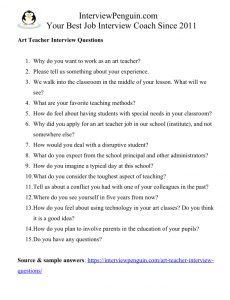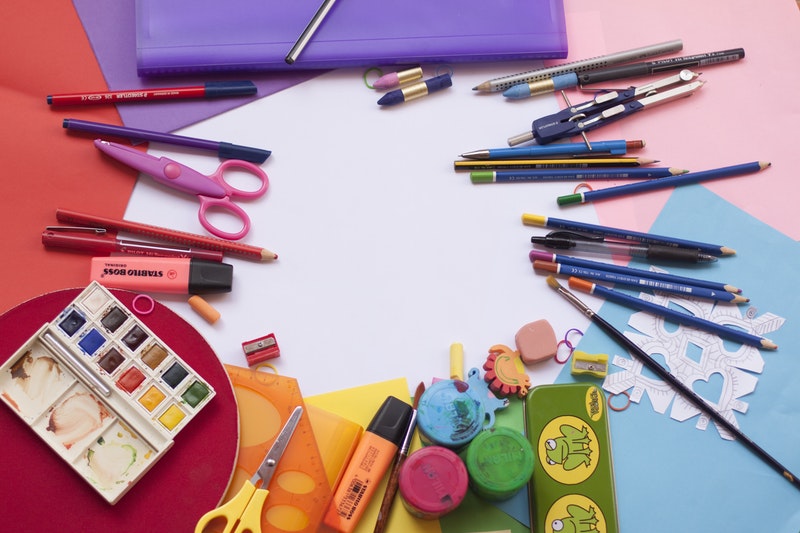The best artist is not necessarily the best teacher. That’s the most important thing you should remember when preparing for your interview.
Certainly it is a good idea to bring some of your best works with you (ideally showcasing different techniques of work, some drawings, paintings, sculptures, or at least their pictures). You can even prepare a professional work portfolio if you want. But this won’t decide about your success or failure. Your interview answers will.
In this article I will analyze some questions, including both personal and behavioral questions (the second ones are more difficult).
It should help you understand what they expect to hear from you (as a good candidate for art teaching job), and prepare some good answer upfront. Let’s start!
Table of Contents
Why do you want to work as an art teacher?
You should not say that you enjoy drawing, or painting, or creating. If that’s your passion, you should have become an artist, and not an art teacher. Perhaps you wanted to, but didn’t make the cut (just like 99% of our population), and ended up applying for the teaching job. But this should not be your answer.
Focus on your love for teaching, and for children. You would love to help children develop their creative skills, discover their inner potential. You’d love to guide them on their fascinating journey in the world of creation.
And you consider yourself a good teacher, and know a technique or two. You have an understanding for the emotions and wishes of children, which makes from you a good candidate for the job. These are the reasons interviewers want to hear about. * You may also check 7 sample answers to “Why do you want to be a teacher?”
Please tell us something about your experience.
Finally an opportunity to showcase your portfolio. Remember that it is better to see something once than to hear about it a thousand times. Show them your best works (or pictures of them), but do not boast about the recognition or awards you got for your work.
Tell rather about different techniques you used, and how this can be transferred to the classroom environment. Of course if you taught before (at school, private courses, anywhere else), you should mention this experience, including the awards and accolades your students received.
You should always show positive emotions, and passion for both your creative work and teaching. The members of the hiring committee should get an impression that you enjoy teaching and everything that belongs to it.
We walk into the classroom in the middle of your lesson. What will we see?
Just don’t say that they will see you standing in front of the students, delivering some boring lesson of theory. Oppositely, say that they will see students working passionately on their drawings and designs, while you will be walking from chair to chair, giving advise, helping, praising them for their work.
You can also talk about emotions and atmosphere they will experience while walking into the classroom in the middle of the lesson–excitement, joy, concentration…
What are your favorite teaching methods?
The right answer here really depends on the philosophy of their educational institution, the type of classes they run, number of students in each class, topics they try to cover during one semester, and so on.
But you can always mention more teaching methods, and say that you do not have a favorite one, and will adjust your choice to the situation in the classroom, and the lesson. Mentioning some creative and unorthodox methods (such as learning by playing) is highly recommended in interviews for art teacher positions.
Special Tip: Want to see 7 sample answers to this question and to all other 40 questions you may face in your interview for any teaching job? Check out my eBook, the Teacher Interview Guide, streamline your interview preparation, and get the job. Make sure they do not surprise you with anything on the big day…
How do feel about having students with special needs in your classroom?
Special education is a big topic nowadays, not only in the US. Ensure the interviewers that you support inclusion, and welcome students with special needs in your classes.
Surely, you may need an assistant in certain cases (severe disability, or too many students with special needs), but you also understand the amazing benefits art can have on students with disabilities.
You can even say that in contrary to other subjects, such as Math or Chemistry, special needs students can actually achieve the same results as ordinary students when it comes to artistic work, or they can do even better.
Special Tip: You can also download all questions in a one page long PDF, print it, and practice your interview answers anytime later:

Why did you apply for an art teacher job in our school (institute), and not somewhere else?
You should praise them for something. Maybe an individual approach they apply in the art classes, or the best ateliers, or creative environment where both students and teachers can thrive. One way or another, they should get an impression that they are your first choice.
Another alternative is referring to a personal recommendation (from a principal, one of the art teachers working at school, etc), or to some other connection you have with the school (you studied there, your children attend the classes, etc).
And if you cannot discover any better reason, you can always refer to a convenient traffic connection, or simply to a good location of the school. For more information, check 7 sample answers to “Why do you want to work for this school district?” interview question.
How would you deal with a disruptive student?
You can start your answer by saying that you will try to make the lessons engaging and interesting for the students, minimizing the likelihood of disruptive behavior.
However, as you certainly know from your teaching experience (or will learn soon), in reality there is always at least one student who tries to spoil the morale in the classroom.
Say that you would try to understand their reasons. Don’t they enjoy the classes? Do they experience any problems in their personal life? You may also suggest consulting school psychologist or counselor, or perhaps their parents, trying to find more information. Once you understand the reasons for their behavior, you will try to address them.
And if your best efforts fail (which will often be the case), you will either suggest a disciplinary action, or try to involve school psychologist or other professional in the process of remedying the situation.
In any case, you will try your best, becasue the last thing you want to see is a single student spoiling the atmosphere in the entire classroom…
Other questions you may face in your art teacher interview
- What do you expect from the school principal and other administrators?
- How do you imagine a typical day at this school?
- What are your strengths and weaknesses as a teacher?
- What do you consider the toughest aspect of teaching?
- Tell us about a conflict you had with one of your colleagues in the past?
- Where do you see yourself in five years from now?
- How do you feel about using technology in your art classes? Do you think it is a good idea?
- How do you plan to involve parents in the education of your pupils?
- Do you have any questions?
Conclusion and next steps
Getting a job of an art teacher isn’t the most difficult thing in the world. You typically won’t compete with many other candidates, and you won’t face many tough behavioral questions (only a few, if any).
However, you still need to show the right attitude to your work with children, and convince them of your readiness for this interesting job. Read my hints once again, and try to prepare a good answer to each question from this article.
Once done, do not forget to read other articles on InterviewPenguin.com to continue your interview preparation:
- Elementary Teacher interview questions – trying to get a job at an elementary school? Learn what questions you may face.
- Science Teacher interview questions.
- Music Teacher interview questions.


